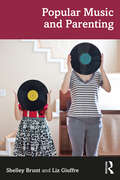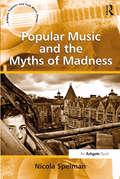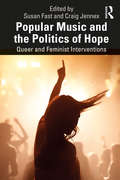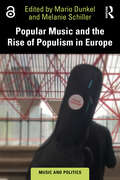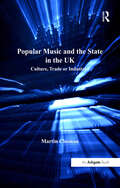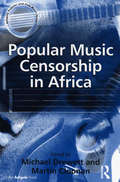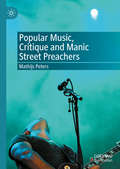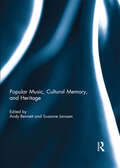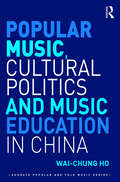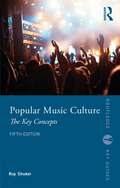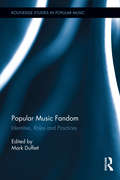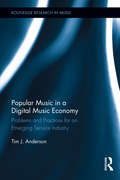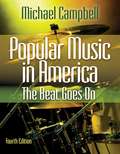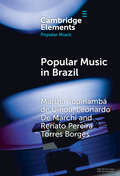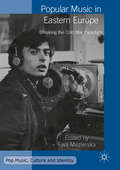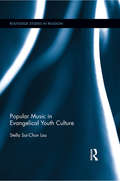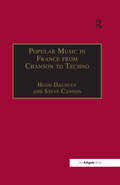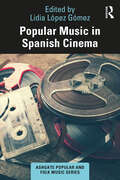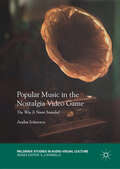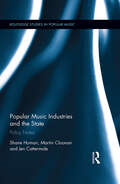- Table View
- List View
Popular Music and National Culture in Israel
by Motti Regev Edwin SeroussiA scholarly book on popular music's role in the national identity and political culture in Israel.
Popular Music and Parenting
by Shelley Brunt Liz GiuffrePopular Music and Parenting explores the culture of popular music as a shared experience between parents, carers and young children. Offering a critical overview of this topic from a popular music studies perspective, this book expands our assumptions about how young audiences and caregivers engage with music together. Using both case studies and wider analysis, the authors examine music listening and participation between children and parents in both domestic and public settings, ranging across children's music media, digital streaming, live concerts, formal and informal popular music education, music merchandising and song lyrics. Placing young children’s musical engagement in the context of the music industry, changing media technologies, and popular culture, Popular Music and Parenting paints a richly interdisciplinary picture of the intersection of popular music with the parent–child relationship.
Popular Music and Parenting
by Shelley Brunt Liz GiuffrePopular Music and Parenting explores the culture of popular music as a shared experience between parents, carers and young children. Offering a critical overview of this topic from a popular music studies perspective, this book expands our assumptions about how young audiences and caregivers engage with music together. Using both case studies and wider analysis, the authors examine music listening and participation between children and parents in both domestic and public settings, ranging across children's music media, digital streaming, live concerts, formal and informal popular music education, music merchandising and song lyrics.Placing young children’s musical engagement in the context of the music industry, changing media technologies, and popular culture, Popular Music and Parenting paints a richly interdisciplinary picture of the intersection of popular music with the parent–child relationship.
Popular Music and the Myths of Madness (Ashgate Popular and Folk Music Series)
by Nicola SpelmanStudies of opera, film, television, and literature have demonstrated how constructions of madness may be referenced in order to stigmatise but also liberate protagonists in ways that reinforce or challenge contemporaneous notions of normality. But to date very little research has been conducted on how madness is represented in popular music. In an effort to redress this imbalance, Nicola Spelman identifies links between the anti-psychiatry movement and representations of madness in popular music of the 1960s and 1970s, analysing the various ways in which ideas critical of institutional psychiatry are embodied both verbally and musically in specific songs by David Bowie, Lou Reed, Pink Floyd, Alice Cooper, The Beatles, and Elton John. She concentrates on meanings that may be made at the point of reception as a consequence of ideas about madness that were circulating at the time. These ideas are then linked to contemporary conventions of musical expression in order to illustrate certain interpretative possibilities. Supporting evidence comes from popular musicological analysis - incorporating discourse analysis and social semiotics - and investigation of socio-historical context. The uniqueness of the period in question is demonstrated by means of a more generalised overview of songs drawn from a variety of styles and eras that engage with the topic of madness in diverse and often conflicting ways. The conclusions drawn reveal the extent to which anti-psychiatric ideas filtered through into popular culture, offering insights into popular music's ability to question general suppositions about madness alongside its potential to bring issues of men's madness into the public arena as an often neglected topic for discussion.
Popular Music and the Politics of Hope: Queer and Feminist Interventions
by Susan Fast Craig JennexIn today’s culture, popular music is a vital site where ideas about gender and sexuality are imagined and disseminated. Popular Music and the Politics of Hope: Queer and Feminist Interventions explores what that means with a wide-ranging collection of chapters that consider the many ways in which contemporary pop music performances of gender and sexuality are politically engaged and even radical. With analyses rooted in feminist and queer thought, contributors explore music from different genres and locations, including Beyoncé’s Lemonade, A Tribe Called Red’s We Are the Halluci Nation, and celebrations of Vera Lynn’s 100th Birthday. At a bleak moment in global politics, this collection focuses on the concept of critical hope: the chapters consider making and consuming popular music as activities that encourage individuals to imagine and work toward a better, more just world. Addressing race, class, aging, disability, and colonialism along with gender and sexuality, the authors articulate the diverse ways popular music can contribute to the collective political projects of queerness and feminism. With voices from senior and emerging scholars, this volume offers a snapshot of today’s queer and feminist scholarship on popular music that is an essential read for students and scholars of music and cultural studies.
Popular Music and the Rise of Populism in Europe (Music and Politics)
by Melanie Schiller Mario DunkelThis book focuses on the role of popular music in the rise of populism in Europe, centring on the music-related processes of sociocultural normalisation and the increasing prevalence of populist discourses in contemporary society. In its innovative combination of approaches drawing from (ethno)musicology, sociology, and political science, as well as media and cultural studies, this book develops a culture-oriented approach to populism. Based on shared research questions, an original theoretical framework and a combination of innovative methodologies that pay attention to the specific socio-historical contexts, taking into account musical material as well as processes of reception, the five chapters in this volume offer detailed analyses of the nexus of popular music and populism in Hungary, Italy, Austria, Sweden and Germany. All of these countries have seen a marked increase in populist parties and discourses over the last years, as well as significant interactions between populism and popular music. This book will be essential reading for those investigating popular music as a crucial aspect in the study of populism as a cultural phenomenon in Europe.The Open Access version of this book, available at http://www.taylorfrancis.com, has been made available under a Creative Commons [Attribution-Non Commercial-No Derivatives (CC-BY-NC-ND)] 4.0 license.
Popular Music and the State in the UK: Culture, Trade or Industry? (Ashgate Popular and Folk Music Series)
by Martin CloonanIn an era of the rise of the free market and economic globalization, Martin Cloonan examines why politicians and policymakers in the UK have sought to intervene in popular music - a field that has often been held up as the epitome of the free market form. Cloonan traces the development of government attitudes and policies towards popular music from the 1950s to the present, discovering the prominence of two overlapping concerns: public order and the political economy of music. Since the music industry began to lobby politicians, particularly on the issue of copyright in relation to the internet, an inherent tension has become apparent with economic rationale on one side, and Romantic notions of 'the artist' on the other. Cloonan examines the development of policy under New Labour; numerous reports which have charted the economics of the industry; the New Deal for Musicians scheme and the impact of devolution on music policy in Scotland. He makes the case for the inherently political nature of popular music and asserts that the development of popular music policies can only be understood in the context of an increasingly close working relationship between government and the cultural industries. In addition he argues that a rather myopic view of the music industries has meant that policy initiatives have lacked cohesion and have generally served the interests of multinational corporations rather than struggling musicians.
Popular Music Censorship in Africa (Ashgate Popular and Folk Music Series)
by Martin CloonanIn Africa, tension between freedom of expression and censorship in many contexts remains as contentious, if not more so, than during the period of colonial rule which permeated the twentieth century. Over the last one hundred years popular musicians have not been free to sing about whatever they wish to, and in many countries they are still not free to do so. This volume brings together the latest research on censorship in colonial and post-colonial Africa, focusing on the attempts to censor musicians and the strategies of resistance devised by musicians in their struggles to be heard. For Africa, the twentieth century was characterized first and foremost by struggles for independence, as colonizer and colonized struggled for territorial control. Throughout this period culture was an important contested terrain in hegemonic and counter-hegemonic struggles and many musicians who aligned themselves with independence movements viewed music as an important cultural weapon. Musical messages were often political, opposing the injustices of colonial rule. Colonial governments reacted to counter-hegemonic songs through repression, banning songs from distribution and/or broadcast, while often targeting the musicians with acts of intimidation in an attempt to silence them. In the post-independence era a disturbing trend has occurred, in which African governments have regularly continued to practise censorship of musicians. However, not all attempts to silence musicians have emanated from government, nor has all contested music been strictly political. Religious and moral rationale has also featured prominently in censorship struggles. Both Christian and Muslim fundamentalism has led to extreme attempts to silence musicians. In response, musicians have often sought ways of getting their music and message heard, despite censorship and harassment. The book includes a special section on case studies that highlight issues of nationality.
Popular Music, Critique and Manic Street Preachers
by Mathijs PetersThis book explores the ways in which popular music can criticise political, social and economic structures, through the lens of alternate rock band Manic Street Preachers. Unlike most recent work on popular music, Peters concentrates largely on lyrical content to defend the provocative claim that the Welsh band pushes the critical message shaped in their lyrics to the forefront. Their music, this suggests, along with sleeve art, body-art, video-clips, clothes, interviews and performances, serves to emphasise this critical message and the primary role played by the band’s lyrics. Blending the disciplines of popular music studies, culture studies and philosophy, Peters confronts the ideas of German philosopher and social critic Theodor W. Adorno with the entire catalogue of Manic Street Preachers, from their 1988 single ‘Suicide Alley’ to their 2018 album Resistance is Futile. Although Adorno argues that popular music is unable to resist the standardising machinery of consumption culture, Peters paradoxically uses his ideas to show that Manic Street Preachers releases shape ‘critical models’ with which to formulate social and political critique. This notion of the ‘critical model’ enables Peters to argue that the catalogue of Manic Street Preachers critically addresses a wide range of themes, from totalitarianism to Holocaust representation, postmodern temporality to Europeanism, and from Nietzsche’s ideas about self-overcoming to reflections on digimodernism and post-truth politics. The book therefore persuasively shows that Manic Street Preacher lyrics constitute an intertextual network of links between diverse cultural and political phenomena, encouraging listeners to critically reflect on the structures that shape our lives.
Popular Music, Cultural Memory, and Heritage
by Andy Bennett and Susanne JanssenPopular music is increasingly being represented and celebrated as an aspect of contemporary cultural history and heritage. In many places across the world, popular music heritage sites – including museums, archives, commemorative plaques adorning buildings, and what could be referred to as DIY music heritage initiatives – constitute some of the key ways in which popular music artists, scenes and events are being remembered. Bringing together a selection of wide-ranging contributions, the purpose of this book is to present a number of case studies from Europe and Australia that demonstrate the variety of ways in which popular music is being cast as cultural heritage and as a medium that invokes the collective memory of successive generations whose identity and sense of cultural belonging have often been indelibly inscribed by the musical soundscapes of their teen and early adult years. This book was originally published as a special issue of Popular Music and Society.
Popular Music, Cultural Politics and Music Education in China (Ashgate Popular and Folk Music Series)
by Wai-Chung HoWhile attention has been paid to various aspects of music education in China, to date no single publication has systematically addressed the complex interplay of sociopolitical transformations underlying the development of popular music and music education in the multilevel culture of China. Before the implementation of the new curriculum reforms in China at the beginning of the twenty-first century, there was neither Chinese nor Western popular music in textbook materials. Popular culture had long been prohibited in school music education by China’s strong revolutionary orientation, which feared ‘spiritual pollution’ by Western cultures. However, since the early twenty-first century, education reform has attempted to help students deal with experiences in their daily lives and has officially included learning the canon of popular music in the music curriculum. In relation to this topic, this book analyses how social transformation and cultural politics have affected community relations and the transmission of popular music through school music education. Ho presents music and music education as sociopolitical constructions of nationalism and globalization. Moreover, how popular music is received in national and global contexts and how it affects the construction of social and musical meanings in school music education, as well as the reformation of music education in mainland China, is discussed. Based on the perspectives of school music teachers and students, the findings of the empirical studies in this book address the power and potential use of popular music in school music education as a producer and reproducer of cultural politics in the music curriculum in the mainland.
Popular Music Culture: The Key Concepts (Routledge Key Guides)
by Roy ShukerNow in its fifth edition, this popular A–Z student reference book provides a comprehensive survey of key ideas and concepts in popular music culture, examining the social and cultural aspects of popular music. Fully revised with extended coverage of the music industries, sociological concepts and additional references to reading, listening and viewing throughout, the new edition expands on the foundations of popular music culture, tracing the impact of digital technology and changes in the way in which music is created, manufactured, marketed and consumed. The concept of metagenres remains a central part of the book: these are historically, socially, and geographically situated umbrella musical categories, each embracing a wide range of associated genres and subgenres. New or expanded entries include: Charts, Digital music culture, Country music, Education, Ethnicity, Race, Gender, Grime, Heritage, History, Indie, Synth pop, Policy, Punk rock and Streaming. Popular Music Culture: The Key Concepts is an essential reference tool for students studying the social and cultural dimensions of popular music.
Popular Music Fandom: Identities, Roles and Practices (Routledge Studies in Popular Music)
by Mark DuffettThis book explores popular music fandom from a cultural studies perspective that incorporates popular music studies, audience research, and media fandom. The essays draw together recent work on fandom in popular music studies and begin a dialogue with the wider field of media fan research, raising questions about how popular music fandom can be understood as a cultural phenomenon and how much it has changed in light of recent developments. Exploring the topic in this way broaches questions on how to define, theorize, and empirically research popular music fan culture, and how music fandom relates to other roles, practices, and forms of social identity. Fandom itself has been brought center stage by the rise of the internet and an industrial structure aiming to incorporate, systematize, and legitimate dimensions of it as an emotionally-engaged form of consumerism. Once perceived as the pariah practice of an overly attached audience, media fandom has become a standardized industrial subject-position called upon to sell box sets, concert tickets, new television series, and special editions. Meanwhile, recent scholarship has escaped the legacy of interpretations that framed fans as passive, pathological, or defiantly empowered, taking its object seriously as a complex formation of identities, roles, and practices. While popular music studies has examined some forms of identity and audience practice, such as the way that people use music in daily life and listener participation in subcultures, scenes and, tribes, this volume is the first to examine music fans as a specific object of study.
Popular Music Genres: An Introduction (Edinburgh University Press Ser.)
by Stuart Borthwick Ron MoyAn accessible introduction to the study of popular music, this book takes a schematic approach to a range of popular music genres, and examines them in terms of their antecedents, histories, visual aesthetics, and sociopolitical contexts. Within this interdisciplinary and genre-based focus, readers will gain insights into the relationships between popular music, cultural history, economics, politics, iconography, production techniques, technology, marketing, and musical structure.
Popular Music Heritage: Places, Objects, Images and Texts (Pop Music, Culture and Identity)
by Andy BennettThis book critically discusses the significance of popular music heritage as a means of remembering and re-presenting rock and pop artists, their music and their place in the culture of contemporary society. Since the mid-1990s, the contribution of popular music to the shaping of contemporary history and heritage has increasingly been acknowledged. In the same period, exhibitions of popular music related artefacts have become more commonplace in museums, and facilities dedicated to the celebration of popular music history and heritage, such as the Rock and Roll Hall of Fame, have opened their doors. Popular music heritage has found other mediums of expression too. There is now a significant popular music heritage media, including books, magazines, films and television series. Fans collect and display their own mementos, while the live performances of tribute bands and classic albums fulfill an increasing desire for the live spectacle of popular music heritage. This book will be crucial reading for established scholars as well as postgraduate and undergraduate students studying popular music heritage.
Popular Music in a Digital Music Economy: Problems and Practices for an Emerging Service Industry (Routledge Research in Music)
by Tim J. AndersonIn the late 1990s, the MP3 became the de facto standard for digital audio files and the networked computer began to claim a significant place in the lives of more and more listeners. The dovetailing of these two circumstances is the basis of a new mode of musical production and distribution where new practices emerge. This book is not a definitive statement about what the new music industry is. Rather, it is devoted to what this new industry is becoming by examining these practices as experiments, dedicated to negotiating what is replacing an "object based" industry oriented around the production and exchange of physical recordings. In this new economy, constant attention is paid to the production and licensing of intellectual property and the rise of the "social musician" who has been encouraged to become more entrepreneurial. Finally, every element of the industry now must consider a new type of audience, the "end user", and their productive and distributive capacities around which services and musicians must orient their practices and investments.
Popular Music in America: The Beat Goes On Fourth Edition
by Michael CampbellThe text provides a rich account of the evolution of popular music from the mid-19th century to the present. Discussions highlight connections, contrasts, and patterns of influence among artists, styles, and eras.
Popular Music in America: The Beat Goes On
by Michael CampbellMichael Campbell's POPULAR MUSIC IN AMERICA, 5th Edition, follows the evolution of popular music from the mid-19th century to the present with discussions of connections, contrasts, and patterns of influence among artists, styles, and eras. <p><p>A new, in-depth section on 21st century music connects you to the content through a modern lens. Units are clearly defined by style and timeframe, and chapters feature narrowly focused objectives to keep you on task. This edition also features a vibrant, richly illustrated, magazine-like design, plus numerous online resources. <p><p>Almost all listening examples are available on Spotify with dedicated unit playlists and/or in YouTube examples which can be found throughout the MindTap version of the text.
Popular Music in Brazil: Identity, Genres and Industry (Elements in Popular Music)
by Martha Tupinambá de Ulhôa Leonardo De Marchi Renato Pereira Torres BorgesThis Element outlines an overview of popular music made in Brazil, from the nineteenth century to the beginning of the twenty-first century. Initially addressing the definition of the 'popular' category, discussion then follows on the ways a Brazilian music identity was built after the country's independence in 1822 until the end of the 1920s. An idea of 'popular music' was consolidated throughout the twentieth century, from being associated with rural musical performances of oral tradition to the recorded urban musical genres that were established through radio and television. After exploring the world of mass popular music, the relationships between traditional and modern, the topics of cultural diversity, multiculturalism, and the impact of digitalization, as well as the musical kaleidoscope of the twenty-first century, the Element ends with an insight into music genres in the era of digital platforms.
Popular Music in Eastern Europe
by Ewa MazierskaThis book explores popular music in Eastern Europe during the period of state socialism, in countries such as Poland, Hungary, Yugoslavia, Romania, Czechoslovakia, the GDR, Estonia and Albania. It discusses the policy concerning music, the greatest Eastern European stars, such as Karel Gott, Czesław Niemen and Omega, as well as DJs and the music press. By conducting original research, including interviews and examining archival material, the authors take issue with certain assumptions prevailing in the existing studies on popular music in Eastern Europe, namely that it was largely based on imitation of western music and that this music had a distinctly anti-communist flavour. Instead, they argue that self-colonisation was accompanied with creating an original idiom, and that the state not only fought the artists, but also supported them. The collection also draws attention to the foreign successes of Eastern European stars, both within the socialist bloc and outside of it. v>
Popular Music in Evangelical Youth Culture (Routledge Studies in Religion #20)
by Stella Sai-Chun LauChristian churches and groups within Anglo-American contexts have increasingly used popular music as a way to connect with young people. This book investigates the relationships between evangelical Christianity and popular music, focusing particularly on electronic dance music in the last twenty years. Author Stella Lau illustrates how electronic dance music is legitimized in evangelical activities by Christians’ discourses, and how the discourses challenge the divide between the ‘secular’ and the ‘sacred’ in the Western culture. Unlike other existing books on the relationships between music cultures and religion, which predominantly discuss the cultural implications of such phenomenon, Popular Music in Evangelical Youth Culture examines the notion of ‘spirituality’ in contemporary popular electronic dance music. Lau’s emphasis on the sonic qualities of electronic dance music opens the door for future research about the relationships between aural properties of electronic dance music and religious discourses. With three case studies conducted in the cultural hubs of electronic dance music – Bristol, Ibiza and New York – the monograph can also be used as a guidebook for ethnographic research in popular music.
Popular Music in France from Chanson to Techno: Culture, Identity and Society (Ashgate Popular And Folk Music Ser.)
by Hugh DaunceyIn France during the 1960s and 1970s, popular music became a key component of socio-cultural modernisation as the music/record industry became increasingly important in both economic and cultural terms in response to demographic changes and the rise of the modern media. As France began questioning traditional ways of understanding politics and culture before and after May 1968, music as popular culture became an integral part of burgeoning media activity. Press, radio and television developed free from de Gaulle's state domination of information, and political activism shifted its concerns to the use of regional languages and regional cultures, including the safeguard of traditional popular music against the centralising tendencies of the Republican state. The cultural and political significance of French music was again revealed in the 1990s, as French-language music became a highly visible example of France's quest to maintain her cultural 'exceptionalism' in the face of the perceived globalising hegemony of English and US business and cultural imperialism. Laws were passed instituting minimum quotas of French-language music. The 1980s and 1990s witnessed developing issues raised by new technologies, as compact discs, the minitel telematics system, the internet and other innovations in radio and television broadcasting posed new challenges to musicians and the music industry. These trends and developments are the subject of this volume of essays by leading scholars across a range of disciplines including French studies, musicology, cultural and media studies and film studies. It constitutes the first attempt to provide a complete and up-to-date overview of the place of popular music in modern France and the reception of French popular music abroad.
Popular Music in Spanish Cinema (Ashgate Popular and Folk Music Series)
by Lidia López GómezPopular Music in Spanish Cinema analyses the aesthetics and stylistic development of soundtracks from national productions, considering how political instability and cultural diversity in Spain determined the ways of making art and managing culture. As a pioneering study in this field, the chronologically structured approach of this book provides readers with a complete overview of Spanish music and connects it to the complex historical events that conditioned Spanish culture throughout the 20th century to the present day, from the Second Republic, the Spanish Civil war, and the dictatorship through to democracy. The book enables an understanding of the relationships between the recording and film production industries, the construction of collective imagination, the formulation of new stereotypes, semiotic meanings within film music and the musical exchanges between national and international cinema. This volume is an essential read for students and academics in the field of musicology, ethnomusicology and history as well as those interested in the study of diverse musical styles such as copla, zarzuela, flamenco, jazz, foxtrot, pop and rock and how they have been used in Spanish films throughout history.
Popular Music in the Nostalgia Video Game: The Way It Never Sounded (Palgrave Studies in Audio-Visual Culture)
by Andra IvănescuThis book looks at the uses of popular music in the newly-redefined category of the nostalgia game, exploring the relationship between video games, popular music, nostalgia, and socio-cultural contexts. History, gender, race, and media all make significant appearances in this interdisciplinary work, as it explores what some of the most critically acclaimed games of the past two decades (including both AAA titles like Fallout and BioShock, and more cult releases like Gone Home and Evoland) tell us about our relationship to our past and our future. Appropriated music is the common thread throughout these chapters, engaging these broader discourses in heterogeneous ways. This volume offers new perspectives on how the intersection between popular music, nostalgia, and video games, can be examined, revealing much about our relationship to the past and our hopes for the future.
Popular Music Industries and the State: Policy Notes (Routledge Studies in Popular Music)
by Martin Cloonan Shane Homan Jennifer CattermoleThis volume studies the relationships between government and the popular music industries, comparing three Anglophone nations: Scotland, New Zealand and Australia. At a time when issues of globalization and locality are seldom out of the news, musicians, fans, governments, and industries are forced to reconsider older certainties about popular music activity and their roles in production and consumption circuits. The decline of multinational recording companies, and the accompanying rise of promotion firms such as Live Nation, exemplifies global shifts in infrastructure, profits and power. Popular music provides a focus for many of these topics—and popular music policy a lens through which to view them. The book has four central themes: the (changing) role of states and industries in popular music activity; assessment of the central challenges facing smaller nations competing within larger, global music-media markets; comparative analysis of music policies and debates between nations (and also between organizations and popular music sectors); analysis of where and why the state intervenes in popular music activity; and how (and whether) music fits within the ‘turn to culture’ in policy-making over the last twenty years. Where appropriate, brief nation-specific case studies are highlighted as a means of illuminating broader global debates.

